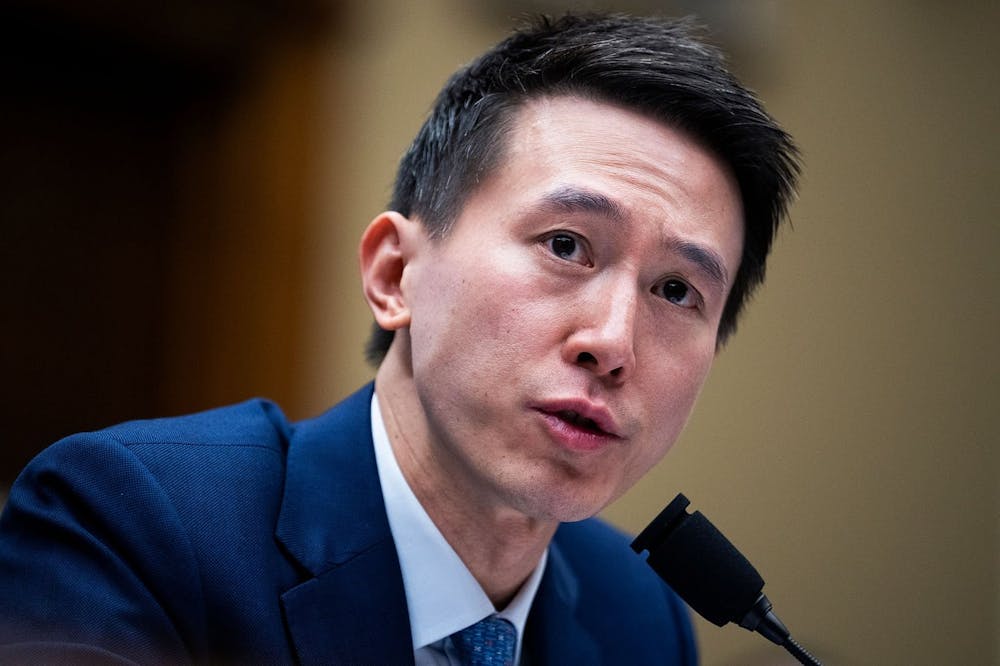By Nicole Trinkl
Staff Writer
As the social media app TikTok has grown in popularity in the United States, increased concerns about privacy and security have arisen, leading to an initiative to try to ban the app. Issues regarding whether the app is collecting Americans’ private information and manipulating users through its algorithm has catapulted Congress’s desire to remove the app entirely from U.S. devices.
Since TikTok’s launch in 2017, the app has grown to have about 150 million active American users to date.
According to Reuters, ever since Donald Trump’s failed attempt to ban TikTok in the U.S. in 2020, TikTok and its Chinese parent company ByteDance have been under fire.
The Wall Street Journal reported that concerns about TikTok began when it was revealed that a Chinese state-controlled entity owned 1% of a Beijing-based subsidiary of ByteDance. This raised questions among Americans on whether, if ordered by the Chinese government, this investor could hand over American users’ private data and control what Americans see on the app.
The Biden administration has been adamant on banning the app. According to USA Today, Biden has already mandated that federal agencies remove TikTok on government-issued devices in fear of security concerns.
According to PBS, the data TikTok collects from its users is most concerning. When one creates a TikTok account the app collects personal information including your location, your contact information, your website activity, the posts and messages you send, etc. Although TikTok is not the only app that collects this type of information, the U.S. government worries that China may be storing Americans’ user data and manipulating users through the content that the app may present.
For example, according to AP News, it was reported that four ByteDance employees were fired for accessing the private data of two journalists from Buzzfeed News and The Financial Times. Additionally, there have been other instances where TikTok has censored and controlled the videos users watch on the platform. In 2019, TikTok told its moderators to censor videos that the Chinese Communist Party deemed controversial, including the 1989 Tiananmen Square massacre and Tibetan independence.
In an attempt to address all the growing worries Americans have about the app, TikTok’s CEO Shou Zi Chew testified before Congress on March 23.
Members of Congress raised several concerns to Chew about the app. Some of the concerns brought up include: whether TikTok is collecting personal information to identify its users, whether TikTok is promoting dangerous and targeted content and whether TikTok is sharing its user data with China.
Chew's opening remarks outlined what the app has done and what Chew and his team are committed to doing to ensure American users’ safety and security.
“Number one, we will keep safety, particularly for teenagers, as a top priority for us. Number two, we will firewall protected U.S data from unwanted foreign access,” Chew said. “TikTok will remain a place for free expression and will not be manipulated by any government.”
Chew also repeated several times throughout the hearing that the app has not and does not share its data with China.
“ByteDance is not owned or controlled by the Chinese government,” Chew said.
Chew explained that U.S. user data is already being held in an American computer software company called Oracle. Although some legacy U.S. data is still sitting in TikTok services in Virginia and Singapore, Chew plans to delete these two services by the end of the year to ensure that all U.S. data be fully protected under U.S. law and in the control of a U.S. security team.
Chew and his team have also been working on building a firewall that protects U.S. user data from unauthorized foreign access called Project Texas. Project Texas, where Oracle is headquartered, would let Americans fully be able to store all their own data and be in control of American users' activity.
Several different public figures have shown their opposition to the possible ban of TikTok including Rep. Alexandria Ocasio-Cortez who posted her first TikTok where she explained why she disagrees with the app’s possible ban.
“[Banning TikTok] doesn't really address the core of the issue, which is the fact that major social media companies are allowed to collect troves of deeply personal data about you,” Ocasio said. “To me, the solution here is not to ban an individual company but to actually protect Americans from this kind of egregious data harvesting that companies can do without your significant ability to say no.”
The possible ban of TikTok has been met with mixed reactions at the College.
Marliana Burg, a senior music education major, commented on the potential ban of the app, highlighting that TikTok isn't the only company taking users' personal information.
"TikTok can not be the only way that other countries are farming, mining and selling our data to learn about what Americans are doing," Burg said. "What is China going to do with my personal [information] that America is not already doing?”
Junior communications major, Jazailis Gual, also expressed her view on the ban, explaining how a decision to ban TikTok would affect her.
"Personally, I use TikTok more than I'd like to each day. If our personal information is being compromised, then I understand logically why it would be banned,” Gual said. “But I believe there are more pressing issues that require our government's attention, such as gun control."
TikTok has not yet been officially banned as Congress is still working on a law to ban the app. According to PBS, efforts to ban the app could be challenging due to the fact that a ban could be interpreted as a violation of Americans' First Amendment rights.
Whether a ban would protect America’s national security is unclear. According to NPR, the Chinese government is estimated to already own around 80% of Americans personal information. A ban would prevent further collection of Americans' personal information, but it has been made clear by Chew that TikTok is not selling user information to China.







